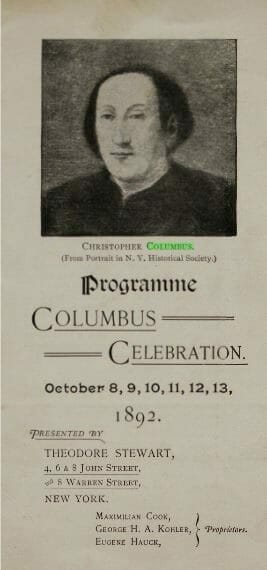Working for a US-based company like Gale, a part of Cengage Learning, it is hard to escape the fanfare of nationwide ‘federal holidays’. Far more interesting – and, seemingly, more commonplace – than the various ‘bank holidays’ we have here in the UK, the US recognises eight official federal holidays. Yet when I noticed that Columbus Day was pencilled in on my email calendar for 10th October 2016, I was surprised to learn that it was not, in fact, considered one of those eight holidays. In 2013, just 24 states observed the holiday. A mark of the re-evaluation of Columbus’s influence upon America and, for many, the effects upon indigenous ways of life, Columbus Day is today a far more contested occasion than it once might have been. With January marking 524 years since Columbus was granted the funds to finally embark upon his first voyage, I was spurred to delve into Gale’s digital archival collections to see if I could detect a change in mood towards Columbus Day observance.
Perhaps unsurprisingly, two of the earlier celebrations of Columbus’s discovery of America, written 300 and 400 years after the event respectively, showed few signs of the hostility towards the event which later emerged. The first, a pamphlet from Eighteenth Century Collections Online entitled ‘An Oration on the Discovery of America’, notes the importance of having a ‘publick [sic] discourse upon the occasion’. Patriotic sentiments ran throughout the piece; the celebration was called to mark the writer’s ‘love and regard to [his] native country’.


What struck me on reading these pamphlets was the notable contrast between their tone and the aforementioned controversy surrounding Columbus Day today. In attempting to understand why – and when – this became more controversial, I utilised one of the key analytical features of Gale Artemis: Primary Sources: the ‘Term Clusters’ tool. With ‘Columbus Day’ as my Keyword, the tool’s algorithm generated a visual graphic of the keywords found most often in the results my search generated. While there are some unsurprising associations apparent (‘United States’ and ‘Celebration’), I was interested to note the presence of terms such as ‘Race’, ‘Color’ and ‘Proclamations’. These words suggest some element of contestation in events.

Selecting results for the ‘Proclamation’ tile, I was drawn to President Ronald Reagan’s 1983 Proclamation on Columbus Day. In this snippet from Associated Press Collections Online, there are signs of Reagan making a concerted effort to emphasise the inclusive nature of Columbus Day: it was a chance for all Americans to recognise the importance of ‘Italian-Americans’ to US society. There had evidently been a subtle shift in tone from the earlier celebrations, with Columbus now being recognised as an Italian-American. The President went even further in 1984, noting that Columbus may not even have been the first to discover America: ‘others had preceded him’. This was not, though, sufficient to deter marking the event; Reagan contended ‘his discovery of the New World stands as a unique and momentous achievement’.

However, in contrast to the earlier documents I looked at, it almost seems as if there was a sudden need to justify celebrating the event. It suggests that the discovery of the ‘land of liberty’ was not perhaps as black-and-white as many first believed. As we pass 524 years since Columbus’s first steps towards his landmark voyage, it is essential to acknowledge this as just one of the disputes underpinning the decision of many in the US not to mark the anniversary.

